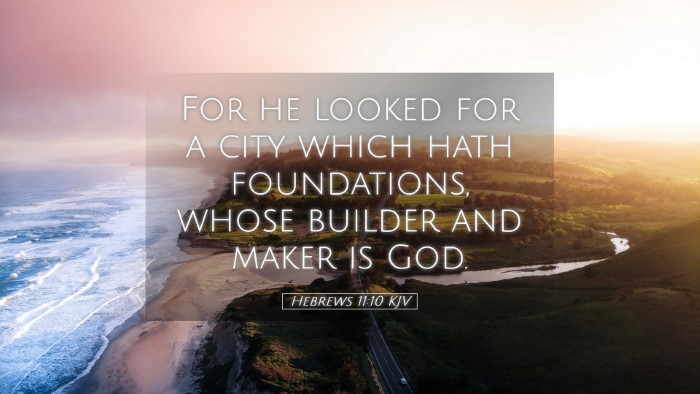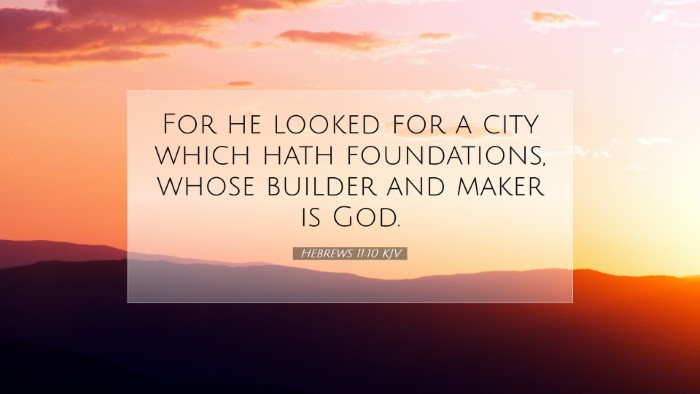Commentary on Hebrews 11:10
Hebrews 11:10 states: "For he looked for a city which hath foundations, whose builder and maker is God." This verse, situated within the context of the Hall of Faith, presents a profound theological understanding of faith through the example of Abraham. This commentary synthesizes insights from prominent public domain commentaries to provide a comprehensive reflection suitable for pastors, students, theologians, and scholars.
Contextual Overview
The Book of Hebrews, believed by many to be written for Jewish Christians facing persecution, emphasizes the superiority of Christ and the New Covenant. In Chapter 11, the author delineates figures of faith from the Old Testament, highlighting their expectations and trust in God's promises. Abraham, as the progenitor of faith, serves as a primary example.
Exegesis of Hebrews 11:10
Faith in God's Promises
Matthew Henry points out that Abraham's faith was not merely about the promises of land but about a deeper spiritual reality—a city prepared by God. This anticipation reflects a Christian's hope for the eternal state, a central theme in the New Testament. Henry further emphasizes that Abraham’s journey was rooted in his vision of divine purpose rather than earthly stability.
The Symbolism of the City
The "city which hath foundations" symbolizes a permanent dwelling, contrasting the temporary nature of earthly cities. Albert Barnes elaborates on this by indicating that such foundations imply solidity and durability, illustrating God’s steadfastness in His promises. This city, built by God, signifies both a heavenly abode and the eschatological hope of believers, pointing towards the New Jerusalem as described in Revelation.
Divine Craftsmanship
Adam Clarke highlights the significance of the phrase "whose builder and maker is God." This description underscores that God is not just a passive figure but actively involved in the creation of this city. Clarke notes that the term ‘builder’ implies ongoing construction, suggesting that the fullness of this promised city is still to come. This character of God as architect serves to instill confidence in believers about His capabilities and intentions for their future.
Theological Implications
The Nature of Faith
Hebrews 11:10 encapsulates the essence of faith as expectancy and longing for God’s ultimate promises. Matthew Henry argues that true faith is marked by looking beyond the present circumstances, seeking a higher reality that God has outlined. Abraham's journey teaches believers to navigate their earthly sojourns with a deeper vision for eternity.
Contrast with Earthly Ambitions
The desire for a city with foundations contrasts starkly with the fleeting nature of earthly ambitions. Albert Barnes asserts that while many seek security and permanence in worldly possessions, true stability is found in the promises of God. This serves as a potent reminder to believers about where to anchor their hopes and aspirations.
Encouragement for the Believer
The promise of a city "whose builder and maker is God" provides profound encouragement. Adam Clarke notes that this assurance can empower believers in times of trial and uncertainty, reinforcing their hope that God is sovereign over their destinies. The imagery of a divinely constructed city evokes a sense of belonging and safety, which is vital for Christians navigating a tumultuous world.
Practical Applications
-
Longing for Eternal Hope: Believers should cultivate a mindset that anticipates God's promises, focusing their hearts on the eternal city rather than transient earthly situations.
-
Confidence in God’s Plan: Understanding that God is both the builder and maker encourages a steadfast trust that He is actively working in their lives, preparing a future filled with hope.
-
Witnessing to Others: The hope described in this verse can serve as a foundation for witnessing to others, exemplifying how faith shapes our lives and expectations in a way that stands in stark contrast to secular views of stability and permanence.
Conclusion
Hebrews 11:10 encapsulates a vital truth about the nature of faith: it is rooted in the anticipation of promises fulfilled by God, which transcends earthly understandings of success and security. Through the examples of Abraham's faith, we are reminded that believers are called to seek a city built by God—a call that profoundly influences our journey, perspective, and ultimate hope.


